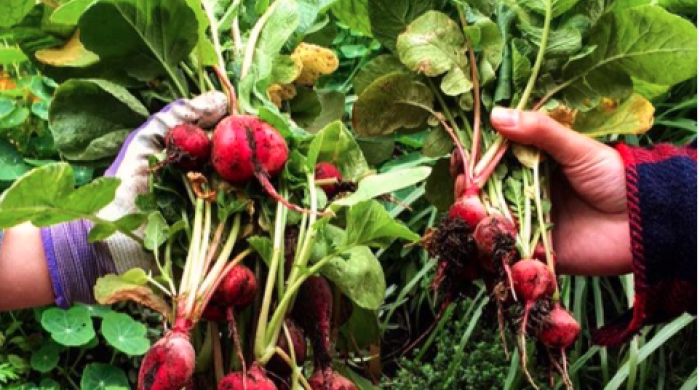Leah Kirts, a 2016 MA in Food Studies alum, is a queer vegan food writer living in Queens. As the pandemic took hold in March, it became clear to Leah that the people in their community most in need of resources had the least access to relief.
Seeking action, Leah joined a mutual aid group in Sunnyside and began organizing mobile food pantries throughout the community – scaling the operation from “a small wheeled cart under the 7 train that held a few bags’ worth of groceries to three locations where we give away entire carfuls of fresh produce, hot food, and groceries” to roughly 150–200 people each week.
Read on to learn more about Leah’s experience as a community organizer and how their background in food studies shapes their activism.
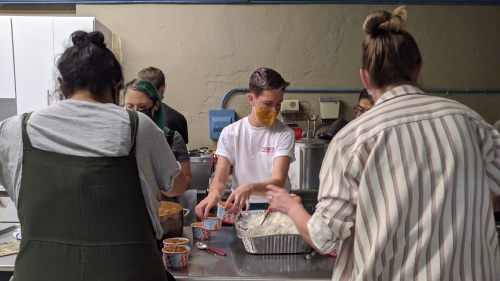
SWMA members meet weekly to pack supplies and meals for distribution at the pantries. Photo courtesy of SWMA.
Can you tell me more about your involvement in food relief efforts in Queens?
After COVID-19 hit, I felt a sense of urgency to put socialist principles like wealth redistribution and mutual aid into practice – something I’d only read and written about but didn’t have much hands-on experience practicing.
At the end of March, I joined a newly formed group in my neighborhood, Sunnyside & Woodside Mutual Aid (SWMA), and started answering phone calls for aid requests from elderly and low-income folks in the area. There was a woman with five young children who called in looking for food after she had waited in line at a school for hours only to be given a few bags of chips and thin sandwiches of white bread, processed lunch meat, and cheese. I heard so many stories like that, which is a shame because the most widely eaten foods like rice and beans are also the cheapest and most nutritious.
I then saw that my friend Michelle Carrera – founder of Chilis on Wheels, a vegan food justice organization – was offering to help people set up mobile vegan food pantries in their neighborhoods and reimburse them for groceries, so I reached out. With help from friends and the mutual aid group, I set up the first table on April 11 and it grew from there. As more people lined up to receive food, more people from SWMA showed up to help give food away, transport supplies in their cars, ask local grocery stores to donate, and spread the word. I’ve been blown away by their creativity and hard work.
Now there’s an entire crew of SWMA members who collectively run three mobile pantries every Saturday where we give away basic pantry staples, hearty vegan meals, fresh produce, and toiletries to approximately 150–200 people each week. We operate from a position of equity not charity, so we don’t ask intrusive questions or require anyone to disclose personal information in order to get aid. It’s really simple: anyone who shows up can get food.
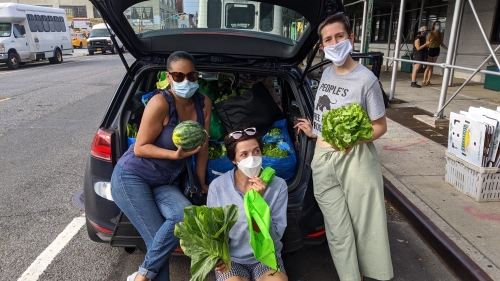
SWMA purchases produce through Sunnyside CSA and gets roughly 100 pounds of donated produce each month from volunteers at Woodside Sunnyside Compost. Photo courtesy of SWMA; Leah far right.
What does your role within SWMA look like?
Currently, my role is to coordinate members for things that happen each week like picking up produce, sorting through food donations, packing supplies for the pantries, planning trips to make bulk purchases, and cooking meals. This entails updating spreadsheets, tracking finances, spending way too much time on Slack, and working in the kitchen and at the pantries alongside neighbors who I probably wouldn’t otherwise know. Mutual aid has helped me hold it together during some really hard times of depression, unemployment, and uncertainty during the dark days of the pandemic.
The hands-on logistics of scaling recipes, slinging vegetables, and moving large amounts of food is something I credit to growing up in a big family with eight siblings where money was tight and we had to solve problems on a shoestring budget every day. My mom is frugal and creative, and she taught us to garden, shop shrewdly for groceries, and cook from scratch to feed a lot of mouths at an early age. Actually, I can’t cook small portions to save my life!
What types of foods are available at these mobile pantries?
In addition to fresh produce, we stock the pantries with staples that are nutrient-dense and nonperishable like rice, beans, canned tomatoes, non-dairy milk, tortillas, pasta, cooking oil, and spices. We avoid animal products and minimize wheat to ensure that anyone can get food without having to compromise their ethics or religious or dietary restrictions.

Shelf-stable food items ready for redistribution. Photo courtesy of SWMA.
Prioritizing vegan ingredients allows us to affordably feed a lot of people while simultaneously reducing food safety risks and keeping in line with the values of mutual aid. Giving away factory-farmed chicken and eggs from miserable caged hens wouldn’t reflect our concern for slaughterhouse workers, nonhuman animals, and communities on the frontlines of climate collapse. But if we can use food to reduce harm while showing solidarity with workers and animals and supporting local food producers, why wouldn’t we?
A lot of people are unhoused or can’t cook for themselves, so from the outset we’ve also made hot meals to distribute. It started with just me and my housemate, Cayetana, cooking large batches of vegetable soup and curried chickpeas in our kitchen, but now it’s grown to a team of 6–8 people who plan out recipes to cook in a church kitchen on Saturday mornings before the pantries. We make about 100–150 all-vegan and mostly gluten-free meals every week to rave reviews!
It’s really simple: anyone who shows up can get food.
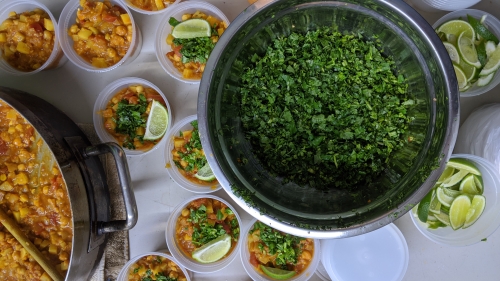
Chana masala is a hearty and nutritious vegan dish that SWMA can serve at scale. Photo courtesy of SWMA.
Has your knowledge of food studies shaped the work you’re doing?
Absolutely. There’s so much to learn about how social issues emerge from industrial policies and oppressive norms – which is why I got into food studies. Food can be a powerful political tool to boycott the global expansion of industrialized agriculture, which is an important piece of a larger socialist movement.
As a writer focused on veganism, labor rights, and queer liberation who has also worked in the food industry intermittently over the last eight years, my path to this work is a result of hands-on experiences and learning about food justice that goes hand-in-hand with leftist (social democratic, communist, anarchist) political education, like what the Black Panthers, Food Not Bombs, the Food Empowerment Project, and others have done.
The dominant food system is undeniably a product of settler-colonial white supremacist capitalism that continues to exploit the labor of workers and animals, pushing the environment to the brink of collapse and causing unfathomable suffering in the name of profit. Animal agriculture is the ultimate culprit of the COVID-19 pandemic because it causes deforestation as well as overcrowded and unsanitary conditions, and impoverishes subsistence farmers who then support themselves through the exotic animal trade. Slaughterhouses are the worst hotspots for COVID-19 outbreaks in the US – as workers are squeezed into crowded and unsanitary conditions, we should not be surprised that outbreaks occur.
What do vegan food redistribution and mutual aid mean to you?
Vegan food redistribution is one part of mutual aid, i.e., people working together to exist outside of a system that was designed to exploit us – which is all the more salient if you’re queer, BIPOC, disabled, and low-income. On top of helping neighbors get groceries for the week so they can eat, mutual aid is about calling attention to the overlapping injustices of capitalism, from healthcare and housing to jobs and education. People lack basic resources for survival and there continues to be a major disconnect between paltry relief offered by the state and what people actually need, e.g., free healthcare, rent cancellation, and money to buy food and pay bills.
The systemic inequality in the US is reflected in our group to some degree in terms of who can give their time each week or share their money, so it’s not fully peer-to-peer in the way that mutual aid would ideally be. But there are people in our group who give aid and receive aid. There are people who don’t have money but do have a car to transport food or free time to share.
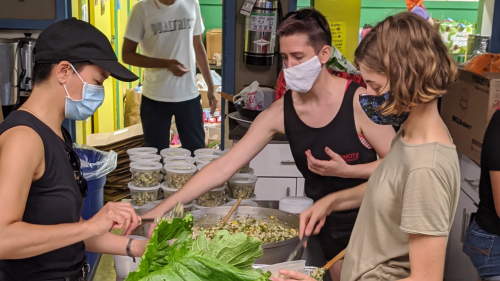
Photo courtesy of SWMA.
Do you have any advice or recommendations for readers looking to get involved?
Check out SWMA to see what we’re doing and visit Mutual Aid NYC to get involved in your own neighborhood if you live in NYC. If you want to learn more about the politics of mutual aid, Dean Spade is a great resource.
What we’re doing is one small effort among many other groups who’ve been doing mutual aid long before it became a buzzword. We build upon a legacy of historic groups like the Free African Society in the 1790s, Chinese immigrants in the early 1900s who built their own hospitals in the midst of an epidemic, sociedades mutualistas of the Southwest, the Puerto Rican Young Lords of Chicago in the 1960s, and the list goes on and on.
I’ve learned a tremendous amount these past months from fellow organizers about openness, communication, and interdependence. It’s messy work that’s far from perfect because we bring ourselves with all of our privilege and trauma, but it’s part of a bigger goal to prefigure the kind of society that we want to live in where people’s lives matter more than property and where the resources we need to survive are abundant because we cooperate with nature instead of trying to dominate it.
Follow Leah on Instagram at @leahkirts or Twitter at @leahkirts. Their writing is published in outlets including Jarry Mag, Saveur, Edible, Tenderly, and more.
About the Master's in Food Studies
Related Department
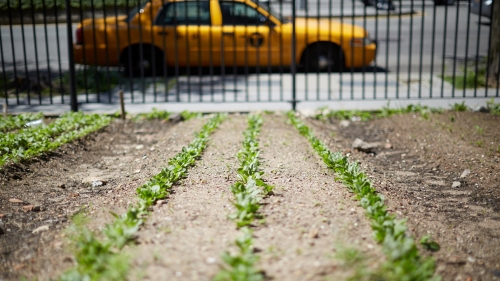
Nutrition and Food Studies
411 Lafayette Street, 5th Floor
New York, NY 10003
Phone: 212-998-5580
Email: nutrition@nyu.edu

